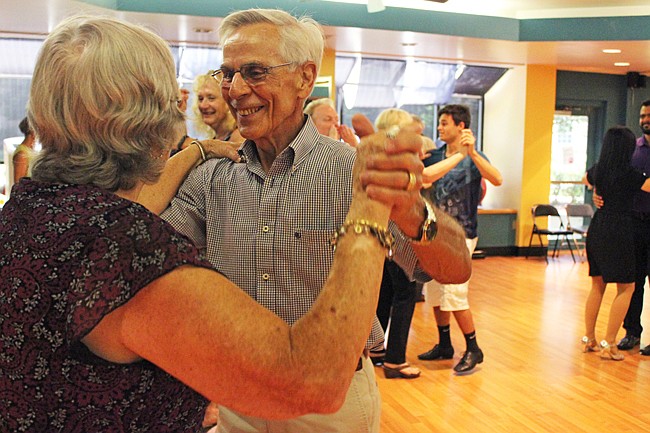- April 15, 2024
-
-
Loading

Loading

Joan Ray has been a dancer since she was a child. She’d watch the afternoon dance shows on TV, spend three afternoons a week after school dancing the jitterbug, and whatever else the kids were excited about at the time. When she got older, she’d hop up with her girlfriends and do a little line dancing if the mood was right. Her husband Roy has always been a bit of a wallflower.
“Most of the time it was Joan getting up and dancing with the girls while I sat over and had a beer, or two, and cheered her on,” he said.
But Joan, 70, hasn’t been dancing in a while. The Winter Springs couple’s life has changed drastically in the last five years, when Joan was diagnosed with Alzheimer’s in 2009. It was gradual at first, Joan putting things in places she normally wouldn’t and then not being able to find them. But it’s gotten a lot harder lately. Joan sometimes wanders the house at night and she can’t drive anymore. Roy has to do all the cooking and housework.
“It’s been a transition from not a big problem at first to significant problems as time went on, to now being able to deal with those problems knowing they’re there and they’re not going to go away and it’s not her, it’s the disease that’s causing the problem,” Roy said.
Their lifestyle has changed considerably, but they still try to do normal couple things. They go out to eat, invite friends over and travel with a motor home group. When Roy saw that the Alzheimer’s Association was offering ballroom dance classes this summer, he saw another opportunity for he and his wife to connect with each other, find potential friends who understand what they’re going through, and have some fun.
The classes, which are free and being held by the Alzheimer Association and the USA Dance Orlando chapter, run every Saturday through July 26 from 2 to 3 p.m. at the Crosby Center YMCA in Winter Park.
The Alzheimer Association Central and North Florida Chapter will be holding free ballroom dance classes for those diagnosed with a dementia and their caregivers – there are volunteer partners available, too – every Saturday in July from 2 to 3 p.m. Classes are at the Crosby Center YMCA in Winter Park and RSVP is required, call 1-800-272-3900.
In 2013 a team of researchers from Nottingham University in the United Kingdom released a study that shows staying active — with your brain and body — could be effective in staving off Alzheimer’s disease. Ballroom dancing activates both.
“While there is not a 100 percent proven method for slowing progression or prevention with the disease; we find that keeping yourself stimulated, keeping your mind active and keeping your body active are really the best ways to help slow progression of the disease and help prevent the decline,” said Danny Anez, associate director of programs for the Alzheimer’s Association Central and North Florida Chapter.
“So ballroom dancing it has the unique ability to both work out your brain and stimulate your brain in new and novel ways as well as physically working yourself out and working on things like balance, which is a huge issue when it comes to senior populations.”
And since there is no cure or real treatment for dementia, an activity like ballroom dancing is worth looking into considering how many Americans the disease impacts. More than 5 million Americans are living with dementia and every 67 seconds another person develops Alzheimer’s, according to statistics collected by the Alzheimer’s Association. Experts estimate that by the year 2050, 16 million people will have the disease.
The symptoms of dementia are incredibly disrupting to daily life for the individual. There’s memory loss and decreased problem solving and reasoning skills. Sufferers experience confusion with time or place, changes in personality and have trouble joining or following a conversation.
That can make a person affected by dementia withdraw from their normal social activities. They stop going to church or having dinner with friends. Anez hopes that the ballroom dance program can keep those people engaged in their community instead.
“It keeps people living with a purpose in life,” he said.
John Davis, president of the Orlando chapter of USA Dance, hopes those who come to the dance program create a stronger bond with their caregiver, have fun and allow them to reminisce about happier times.
“Some of the things that happen when you start with cognitive deterioration is that it does lead to a certain isolation and loneliness, and certainly ballroom dancing with a partner will help them to channel communication on a social level and on a physical level,” he said. “This might even bring back memories of them swing dancing in the past, or salsa dancing.”
Joan’s excited to relive a little bit of her past. She’s a great dancer, Roy said, but he’s a little nervous.
“I’m afraid I’ll step all over her feet.”
“Oh you will not, you’ll do fine,” Joan says.
When he leaves the room she makes a motion, showing off how she’ll be doing the leading while they’re there. She won’t let him step on her feet.